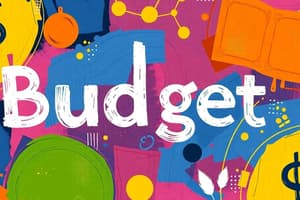Podcast
Questions and Answers
What is the primary focus of an operational budget?
What is the primary focus of an operational budget?
- Day-to-day operational expenses and revenues (correct)
- Forecasting cash inflows and outflows
- Adjusting for variances in sales levels
- Long-term asset investments
Which type of budget is primarily concerned with larger expenditures for long-term assets?
Which type of budget is primarily concerned with larger expenditures for long-term assets?
- Flexible Budget
- Cash Flow Budget
- Capital Budget (correct)
- Static Budget
What process involves collecting past financial data and market analysis before preparing a budget?
What process involves collecting past financial data and market analysis before preparing a budget?
- Define Objectives
- Implement and Monitor
- Review and Revise
- Gather Data (correct)
Which budget type remains fixed regardless of changes in sales or production levels?
Which budget type remains fixed regardless of changes in sales or production levels?
Which aspect of budgeting helps in long-term planning and optimal use of financial resources?
Which aspect of budgeting helps in long-term planning and optimal use of financial resources?
What is the role of the flexible budget in financial reporting?
What is the role of the flexible budget in financial reporting?
In which stage of the budgeting process is future income estimated based on historical data?
In which stage of the budgeting process is future income estimated based on historical data?
Which budgeting step involves analyzing the budget and making necessary adjustments before it is finalized?
Which budgeting step involves analyzing the budget and making necessary adjustments before it is finalized?
What crucial benefit does budgeting provide in evaluating financial performance?
What crucial benefit does budgeting provide in evaluating financial performance?
Flashcards are hidden until you start studying
Study Notes
Definition of Budget
- A budget is a financial plan that outlines expected income and expenditures over a specific period.
- It helps in managing finances effectively by forecasting financial performance.
Types of Budgets
-
Operational Budget
- Focuses on day-to-day operational expenses and revenues.
- Typically covers a one-year period.
-
Capital Budget
- Plans for long-term investments in assets (e.g., equipment, facilities).
- Involves larger expenditures requiring justification of benefits.
-
Cash Flow Budget
- Projects cash inflows and outflows over a specific period.
- Ensures that there is enough cash for operations and obligations.
-
Static Budget
- Remains unchanged regardless of variations in sales or production levels.
- Useful for fixed costs but may not reflect actual performance.
-
Flexible Budget
- Adjusts based on actual levels of activity.
- Provides a more accurate comparison of budgeted vs. actual performance.
Importance of Budgeting
- Financial Control: Monitors spending and helps maintain control over finances.
- Decision Making: Informs strategic decisions based on financial data.
- Performance Evaluation: Assists in evaluating financial performance against set goals.
- Resource Allocation: Ensures optimal use of financial resources.
Budgeting Process
- Define Objectives: Establish what the budget aims to achieve.
- Gather Data: Collect financial data from past performance and market analysis.
- Forecast Revenue: Estimate future income based on historical data and market trends.
- Estimate Expenses: Predict costs associated with sales, production, and operations.
- Prepare Budget: Draft the budget document incorporating income and expenses.
- Review and Revise: Analyze and adjust the budget as necessary before final approval.
- Implement and Monitor: Execute the budget and regularly monitor performance against it.
Common Budgeting Tools
- Spreadsheets: Excel or Google Sheets for detailed calculations and tracking.
- Budgeting Software: Programs designed for financial planning (e.g., QuickBooks).
- Financial Ratios: Metrics (e.g., profit margin, ROI) to evaluate budget effectiveness.
Challenges in Budgeting
- Estimating accurate revenues and expenses can be difficult.
- Economic fluctuations may impact the budget's validity.
- Resistance to budget constraints from departments or individuals.
Best Practices
- Involve all stakeholders in the budgeting process for better buy-in.
- Regularly review and adjust budgets to reflect changing conditions.
- Use historical data as a baseline for more accurate forecasting.
- Monitor performance consistently and provide feedback for accountability.
Definition of Budget
- A budget serves as a financial blueprint detailing projected income and expenditures for a designated timeframe.
- It aids in effective financial management, allowing for forecasting of financial outcomes.
Types of Budgets
- Operational Budget: Concentrates on routine operational costs and revenues; typically spans one year.
- Capital Budget: Involves planning for long-term investments in significant assets, necessitating justification of expected benefits.
- Cash Flow Budget: Estimates cash inflows and outflows to ensure sufficient cash availability for operations.
- Static Budget: Fixed and unchanged despite variations in sales or production, useful for managing fixed costs.
- Flexible Budget: Adjusts according to actual activity levels, offering a precise comparison between budgeted and actual outcomes.
Importance of Budgeting
- Financial Control: Provides mechanisms for monitoring expenditure and maintaining financial discipline.
- Decision Making: Facilitates strategic decisions grounded in solid financial analysis.
- Performance Evaluation: Allows assessment of financial results against predetermined targets.
- Resource Allocation: Promotes optimal utilization of financial resources to achieve objectives.
Budgeting Process
- Define Objectives: Clarify goals that the budget is intended to achieve.
- Gather Data: Compile financial information from past performance metrics and market assessments.
- Forecast Revenue: Project future income by analyzing historical trends and expecting market conditions.
- Estimate Expenses: Anticipate costs linked to sales, production, and operational activities.
- Prepare Budget: Create a draft budget document incorporating income projections and expenditure estimates.
- Review and Revise: Scrutinize the budget and make necessary adjustments before finalization.
- Implement and Monitor: Execute the budget plan and consistently track performance against expectations.
Common Budgeting Tools
- Spreadsheets: Tools like Excel or Google Sheets for conducting detailed financial calculations and tracking expenses.
- Budgeting Software: Specialized programs such as QuickBooks designed for comprehensive financial planning.
- Financial Ratios: Use metrics (e.g., profit margin, ROI) to assess the effectiveness of the budget.
Challenges in Budgeting
- Difficulty in accurately forecasting revenues and expenditures.
- Economic variability may jeopardize the integrity of the budget.
- Potential pushback from departments or individuals regarding budget limitations.
Best Practices
- Engage all stakeholders in the budgeting process to enhance commitment and acceptance.
- Conduct regular reviews to update budgets reflecting dynamic business conditions.
- Utilize historical data as a benchmark to improve forecasting accuracy.
- Consistently monitor financial performance and provide accountability through feedback.
Studying That Suits You
Use AI to generate personalized quizzes and flashcards to suit your learning preferences.




